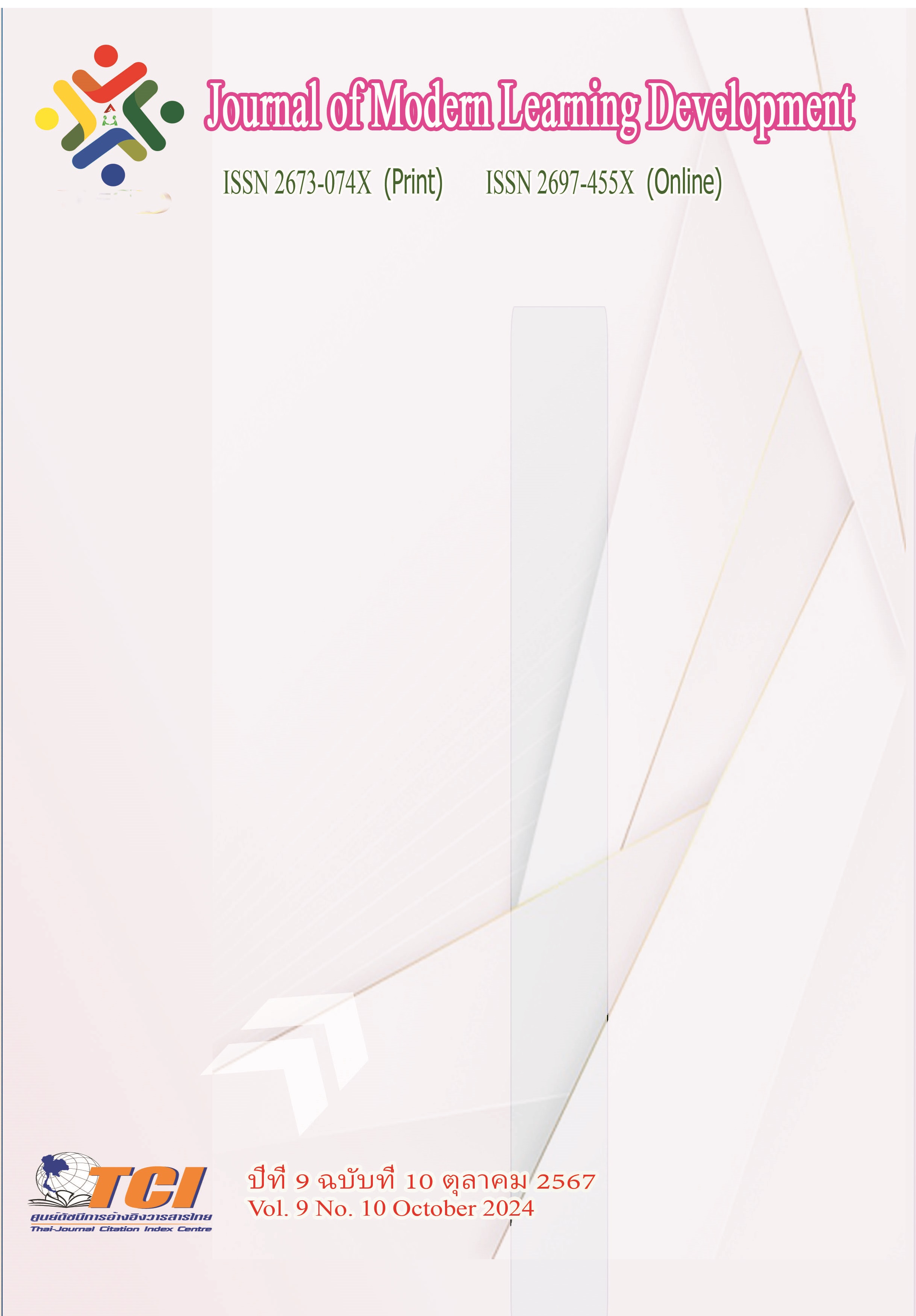The Quality Assurance of Online Courses Based on CIPP Model in Guilin Institute of Information Technology (GIIT)
Main Article Content
Abstract
With the deep integration of Internet technology and educational informatization, the online course teaching mode, facilitated by the Internet as a transmission channel, has gradually infiltrated into higher education. The quality assurance of online course teaching in higher education is a part of the overall management of teaching quality, serving as both a guarantee and a prerequisite for the orderly development of online teaching. It is imperative to investigate the current status of quality assurance for online course teaching in higher education and to study the paths that ensure the quality of online teaching in universities. This research is urgent and crucial in promoting the construction of high-quality online courses in current times.
The objectives of this research were: 1. To study the Quality Assurance of Online Courses Based on CIPP Model. 2. To study the improvement strategies of teaching quality management of online courses in universities and the optimization suggestions of quality assurance. The study sample consists of 410 students who have taken online courses at Guilin Institute of Information Technology (GIIT), as well as 10 teachers and administrators responsible for online course instruction. To collect data for this study, research tools and procedures were developed, with a reliability of 0.92. Statistical analysis methods, including percentages, means, standard deviations, and content analysis, were employed in the study.
The research findings reveal that: (1) The overall quality assurance of online course instruction at GIIT is at a relatively high level. The highest level is observed in the background assurance measures for online courses ( =4.18, S.D.=0.93), followed by effectiveness assurance ( =4.14, S.D.=0.99), implementation assurance ( =4.12, S.D.=0.99), and slightly lower in input assurance ( =4.08, S.D.=1.03). (2) The quality assurance of online course instruction in higher education, based on the CIPP model, includes: 1) Background Assurance; 2) Input Assurance; 3) Implementation Assurance; 4) Effectiveness Assurance.
Article Details
References
Darvishi, A., Khosravi, H., Sadiq, S., & Gašević, D. (2022). Incorporating AI and learning analytics to build trustworthy peer assessment systems. British Journal of Educational Technology, 53 (4), 844–875. https://doi.org/10.1111/bjet.13233
Guohe, L. Jianhui, Z. & Weijiang, W. (2018). Improving the Online Teaching Environment to Enhance Classroom Teaching Quality. Higher Education Journal, 8, 3.Hafeez, M., Naureen, S., & Sultan, S. (2022). Quality Indicators and Models for Online Learning Quality Assurance in Higher Education. Electronic Journal of E-Learning, 20 (4), 374–385.
Intarasompun, W., Muangnual, P., and Punchatree, N. (2022). Active Learning Management and Using E-Portfolio as Authentic Assessment for Teacher Students. Journal of Yanasangvorn Research Institute Mahamakut Buddhist University, 13 (2),108–118. Retrieved from https://so04.tci-thaijo.org/index. php/yri/article/view/262856
Jianshe, Z. (2012). A Study on Factors Affecting the Quality of Distance Education. Chinese Adult Education, 22, 183–185.
Jung, I. S. (2004). Convergence and Diversity of Quality Assurance Systems in Distance Education for Higher Education. The SNU Journal of Education Research, 13, 75–106.
Qin, L. (2020). The Construction of the Third-party Evaluation System in Vocational Education:International Experience and Chinese Strategies. Adult Education. 3 (3), 49-53.
Qiaoyan, P. (2020). Construction of Quality Monitoring and Assurance System for Online Teaching in Local Ordinary Colleges. Journal of Hengyang Normal University, 41 (5), 5.
Shaoming, X., Xianwen, L., & Yonghong, C. (2021). Construction of a Comprehensive Quality Monitoring and Evaluation System for Online Teaching in Local Applied Undergraduate Colleges. Journal of Huainan Normal University, 23 (1), 68–73.
Shaoqing, G. (2023). Research on the Transformation trategy of Digitalization of Education Empowering New Curiculum lmplementation and Teacher Training. China Educational Technology. (07),51-60.
Stufflebeam, D. L. (1969). Evaluation as enlightenment for decision making. Improving Educational Assessment & An Inventory of Measures of Affective Behavior, edited by Walcott H. Beatty (pp. 41-73).Washington, D.C: The Association for Supervision and Curriculum Development, NEA.
Stufflebeam, D. L., Madaus, G. F., & Kellaghan, T. (2000). Evaluation models: Viewpoints on educational and human services evaluation (Vol. 49). Springer Science & Business Media.
Tosati, S. ., Sitthisopasakul, T., and Intarasompun, W. (2021). Enhancing Learning Process by Integrating Contemplative Education Coaching System and Research Base Learning (Ccr) to Strengthen Teacher’s Competencies in Educational Measurement Evaluation and Research Program, Faculty of Education, Bansomdejchaopraya Rajabhat University. Journal of Modern Learning Development, 7 (1),124–137. https://so06. tci-thaijo.org/index.php /jomld/article/view/250866/171898
Yujun, J., Xuemei. B., Wenchen. W., & Xiaojuan, L. (2019). Research on the Structural Relationship of lnfluencing Factors of Online Learning Experience. Modern Distance Education. (01), 27-36. doi:10.13927/j.cnki.yuan.2019.0004.
Zhili, Q., & Tongxu, W. (2017). Theoretical Exploration of the Long-term Quality Assurance System for Distance Education. Educational Materials, 25, 127–128.


